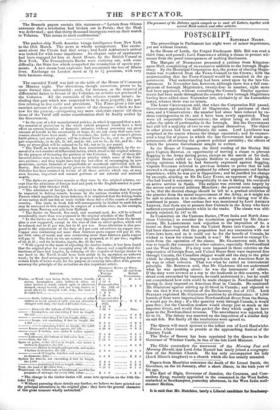POSTSCRIPT.
In the House of Lords, the Forged Exchequer Bills Bill was read a third time, and passed ; Lord BROUGHAM adding a clause to protect wit- nesses from the penal consequences of making disclosures.
The Marquis of NORMANDY presented a petition from Kingston- upon-Hull, complaining of an excessive addition to the borough Magis- tracy. By the Municipal Corporation Act, the power of electing Magis- trates was tranferred from the Town-Council to the Crown ; with the understanding that the Town-Council would be consulted in the ap- pointment. That understanding had been acted upon by the late Go- vernment. In November last, however, although there was a fall com- plement of borough Magistrates, twenty-four in number, eight more had been appointed, without consulting the CounciL Similar appoint- ments had been made throughout the country ; 364 borough Magistrates having been added since September last, exclusively of the Lancashire towns, whence there was no return.
The LORD CHANCELLOR said, that when the Corporation Bill passed, Government appointed in Hall 23 Magistrates, 19 partisans of their own, and 4 Conservatives : the number had since been reduced by va- rious contingencies to 16; and 8 have been newly appointed. They were all respectable Conservatives ; the object being to dilute and soften the spirit of partisanship in the borough. But the Government had still left a majority of two to one against themselves. The object in other places had been uniformly the same. Lord Lyndhurst was surprised at the source whence the charge emanated ; and he enumer- ated a long list of places in which the late Government had made ap- pointments, all evincing the grossest political partiality ; the effects of which the present Government sought to correct.
In the House of Commons, the third reading of the Mutiny Bill gave Captain BERNAL an opportunity of moving a clause to prevent flogging in the Army during peace, except on the march or for theft. Captain Bernal called on Captain Boldero to support with his vote strong opinions which he had formerly expressed against flogging. Captain BOLDERO referred to previous debates to prove that he had avowed a change of opinion, produced by others' arguments and further experience, while he was yet in Opposition ; and he justified his change by example, alluding to Sir De Lacy Evans, an opponent of flogging, who had found it necessary energetically to use it during his command on active service in Spain. The subject was entered into largely by the mover and several military Members; the general sense appearing to be, that the desired change should be left to a gradual alteration of the practice from the moral improvement of the Army, as it might not be safe to abandon it in war-time, or to enforce it during war if dis- continued in peace. One curious fact was mentioned by Lord ARTHUR LENNOX, that there are at present four Colonels in the Army who have suffered corporal punishment while in the ranks. The clause was ulti- mately rejected, by 187 to 59.
In Committee on the Customs Duties, (West India and North Ame- rican Colonies,) to consider the resolutions proposed by Mr. GLAD- STONE, ME LABOUCHERE took objection to the imposition of 28. a barrel on flour imported from the United States into Canada. As it had been disavowed that the proposition had any connexion with our Corn-laws here, and as it could not be for the benefit of Canada, he wished to know for whose benefit it was ? He moved to exempt Ca- nada from the operation of the clause. Mr. GLADSTONE said, that it was to benefit the consumer in other colonies, especially Newfoundland and the West Indies. If a duty were imposed in those colonies on the importation of foreign flour, and United States flour were imported free through Canada, the Canadian shipper would add the duty to the price which he charged, thus imposing a transit-tax on American flour, in its way to other colonies. That was what he called an intercolouial principle. Mr. ROEBUCK said, that Mr. Gladstone did not understand what he was speaking about: he was the instrument of others. If the duty were avowed as a sop to the landlords in this country, who dread corn untouched by imposts, he could understand it ; but he could not comprehend how corn could be made cheaper in Newfoundland by having 2s, duty imposed on American flour in Canada. He cautioned Mr. Gladstone against stirring up ill-blood in Canada ; and objected to the tax that it was a violation of the Declaratory Act of 1778. Lord STANLEY explained Mr. Gladstone's position by an illustration : if 1,000 barrels of flour were imported into Newfoundland direct from the States, it would pay 2s. duty ; if a like quantity went through Canada, it would pass free ; but the Canadian dealers would charge just as much as the importer direct, and would thus pocket the duty which ought to have gone to the Newfoundland revenue. The amendment was rejected, by 63 to 54. The debate was renewed on the imposition of a similar duty on salt fish. But finally all the resolutions were agreed to.
























 Previous page
Previous page